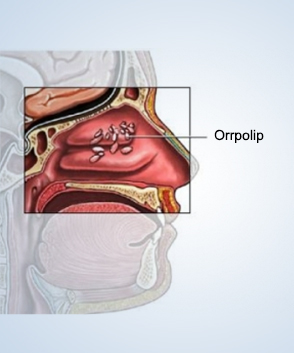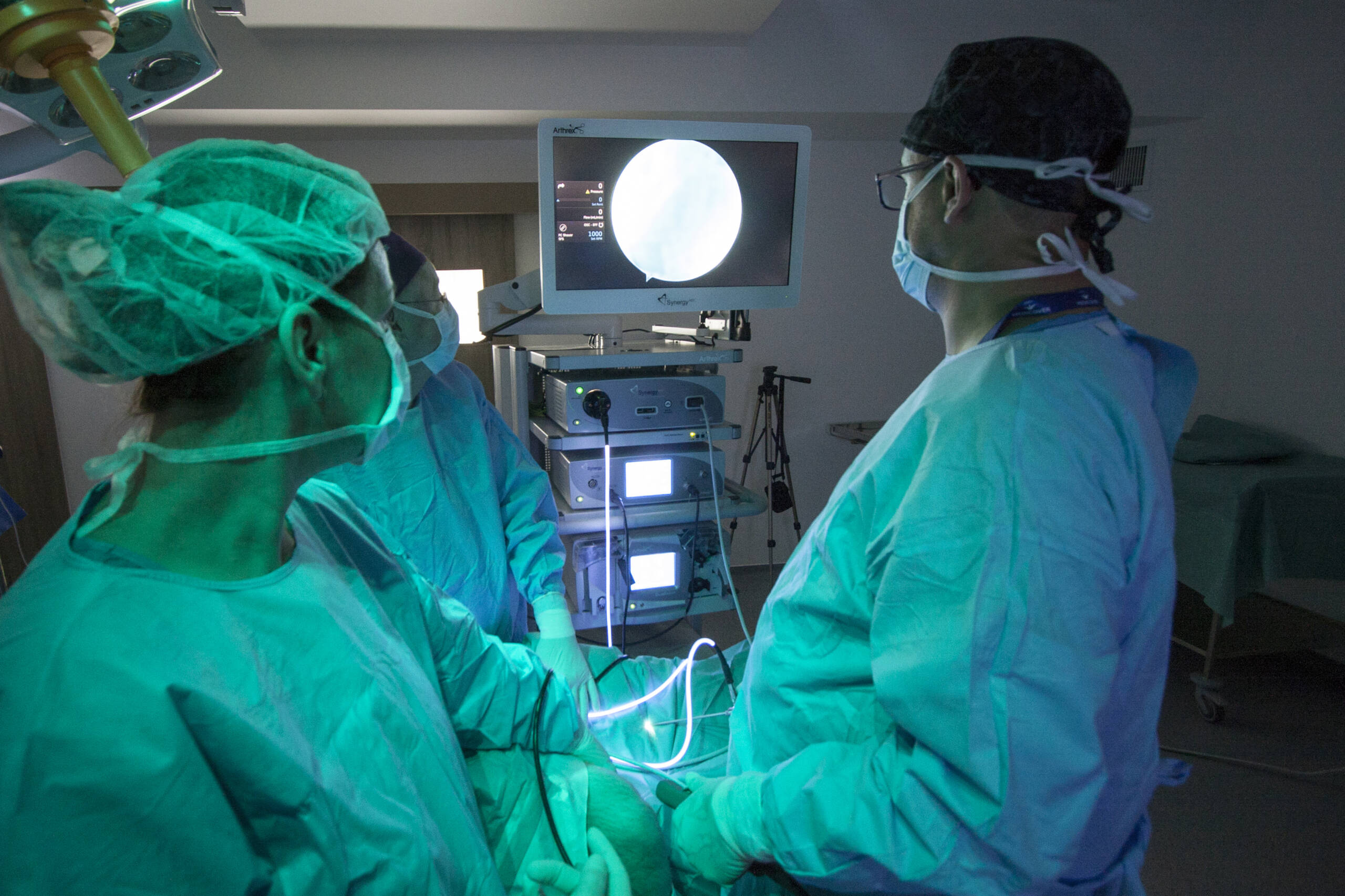FESS surgery (Functional endoscopic sinus surgery, nasal polyp surgery)
Nasal polyps are non-neoplastic, painless, teardrop or grape-shaped swollen lumps on the nasal or paranasal mucosa. They occur due to asthma, allergies, drug sensitivity, and chronic or recurrent sinusitis as a result of certain immune diseases.
While smaller nasal polyps do not necessarily cause symptoms, larger lumps or nasal polyps appearing in groups can cause nasal congestion, difficulty breathing, loss of smell, and infections. Larger nasal polyps can even change the shape of the nose.
Chronic sinusitis is an inflammation of the nose and sinuses that usually lasts for at least three months and does not improve satisfactorily with medication. Symptoms of chronic sinusitis include nasal congestion, runny nose, facial pain, headache, recurrent lower respiratory tract infections, and bronchial asthma.
When is FESS surgery (functional endoscopic sinus surgery) necessary?

The most common causes of endoscopic sinus surgery are chronic sinusitis and nasal polyps, but less frequently, recurrent infections, impaired sense of smell, inflammation of the sinuses expanding to the eyes, face and brain, tumours of the nose and sinuses (malignant and benign), cerebrospinal fluid leaking into the nose, and tear duct obstruction also require surgery.
How is the procedure done?
Endoscopic sinus surgery (FESS surgery) can also be performed under local anaesthesia and general anaesthesia, depending on the extent and duration of the procedure, with surgery lasting about 30 to 80 minutes.
During the procedure, the surgeon inserts an endoscope (a small tube) with a tiny camera into the nostril to examine the nose and sinuses. The surgeon then uses small instruments to remove polyps and other blockages, enlarge the narrow cavities connecting the sinuses and the nose, thus improving the drainage of fluid in the sinuses into the nose.
During nasal polyp surgery, sometimes the nasal septum and lower nasal concha also need to be operated on. For more information on nasal septum and nasal congestion surgeries, see the description of those surgeries.
What are the advantages and risks of surgery?
The most important goal of sinus surgery is to improve the drainage of the sinuses. By widening the natural drainage path, infections of the sinuses are reduced, nasal polyps can be avoided, nasal congestion can be avoided, and breathing is significantly improved. Another advantage of the method is that drugs (sprays, carbureted drugs) delivered directly to the mucous membranes of the sinuses can become much more effective.
Possible complications of sinus surgery, such as bleeding, eye and vision damage, intracranial complications (brain injury, cerebrospinal fluid leakage, brain infection), are rare. However, it is important to mention that these cavities are located right next to the eye sockets and below the lower part of the brain. Failure to treat chronic sinusitis in itself can lead to serious problems such as infection of the brain or eyes.
You will receive a statement of consent and a detailed information about the FESS surgery, the risks of the surgery, the tasks required before the surgery. In all cases, it is possible to discuss the possible risks of surgery with your doctor before deciding on treatment.
There are also risk factors associated with general anaesthesia, for which we provide a separate information sheet and a statement of consent. However, preoperative examinations ensure that the risk is minimal.
- It is very important that you call your surgeon immediately in case of fever, persistent nosebleeds, bloody sputum, vomiting or severe headache!
Am I fit for FESS surgery?
Your otolaryngologist will inform you about everything about nasal polyp surgery.
Nasal polyp surgery in our private hospital begins with a specialist consultation and then you have to undergo some tests (nasal endoscopy, blood and allergy tests, nasal and paranasal sinus CT, ECG) as well as consult your anaesthesiologist and internist before the operation. This ensures that your general health allows you to have FESS surgery under general anaesthesia.
All of our patients are asked to complete a detailed medical history sheet. This is necessary for the surgeon and doctors, as this is how they decide if you are suitable for the surgery.
How do I prepare for FESS surgery?
- Make a list of all your symptoms, other health problems, previous illnesses, and allergies, even if they do not seem to be related to your complaint. You will need to fill out a detailed form followed by a physical examination.
- Follow the instructions before surgery. The otolaryngologist tells you everything how to prepare for diagnostic tests.
- Make a list of all the medications, vitamins, and supplements you take.
- Ask a family member or friend to accompany and help you recall all the necessary information during the consultation.
- The consultation and nasal polyp surgery will take place at our private clinic in Budapest.
- Before surgery, you will receive a patient information form and a statement of consent, in which you will find all the necessary information before and after the surgery, please read and sign!

What to do after FESS surgery?
If nasal gauze plugs have been inserted, you are expected to experience moderate pain in the first few days after surgery. It can be treated with oral analgesics. Removing nasal gauze plugs can be inconvenient, depending on individual sensitivity. Nasal congestion, runny nose, and discomfort can also occur 3 to 10 days after surgery. The day after FESS surgery, the swelling around the nose is natural.
Only take medication that has been approved by our clinic and discuss with your otolaryngologist what kind of postoperative care you need to get your nose completely healed.
It is natural, if you feel slow and clumsy for a day after general anaesthesia.
If there is no bleeding, you can return home the first day after surgery. We recommend that you rest for about two weeks after surgery. Your surgeon will provide more detailed information and advice.
Avoid strenuous physical activity for two to three weeks after surgery, which can lead to nosebleeds.
Blow your nose carefully. For the first few days, it is advisable to just wipe your nose. You can then gradually blow your nose again.
It may be necessary to use a nasal oil/ointment or nasal rinse for 3-4 weeks after FESS surgery.
Why is regular follow-up after FESS surgery important?
The first follow-up examination takes place one week after surgery, in which case a nasal cleansing treatment is needed to prevent possible infections adhesions of the nose. The second follow-up examination is within two weeks. However, regular monitoring is still needed if the polyps reappear.
What is included in the price of FESS surgery at Medicover Hospital?
The price of nasal polyp surgery includes the cost of the surgery as well as the cost of the hospital stay after the surgery and the follow-up examinations. The fee of the preliminary specialist consultation and the pre-operative examinations is not included in the surgical price, please inquire about the cost of these from our Customer Service.
Convenience services
We accommodate our clients in a modern, pleasant, air-conditioned single room. Each room has a private bathroom, fridge and TV, and free WIFI access. We also provide our clients with individual nurse supervision, who will help your continuous recovery during your stay.

